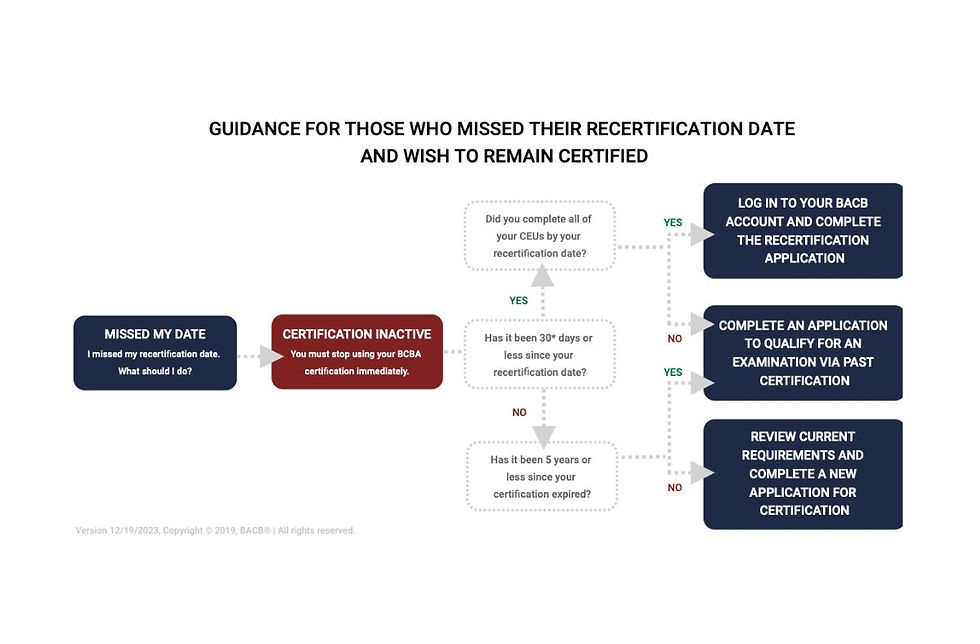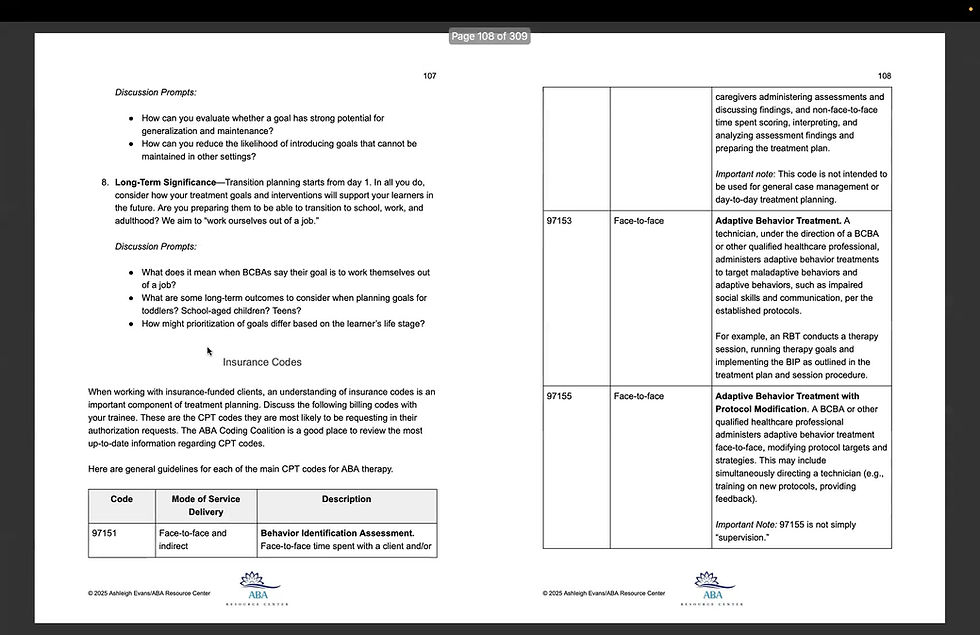BCBA CEU Requirements: Your Guide to Continuing Education
- Ashleigh

- Aug 10
- 7 min read

To maintain certification, Board Certified Behavior Analysts (BCBAs) must meet continuing education requirements during each two-year certification cycle. These requirements help ensure that professionals stay current with best practices, new research, and ethical guidelines.
In this guide, you'll find a clear breakdown of CEU requirements, how to earn and track CEUs, where to find courses, and answers to common questions about the recertification process.
How Many CEUs Do BCBAs Need?
BCBAs need to accrue 32 CEUs every two years to maintain their certification.
Breakdown of the CEU Requirements
CEUs are divided into three content categories, which include:
Supervision
Ethics
General
During each two-year certification cycle, BCBAs are required to complete:
At least 3 CEUs in the Supervision category (If the BCBA is a supervisor), and
At least 4 CEUs in the Ethics category
The remaining CEUs can come from any of the three categories. BCBAs can choose to complete additional CEUs in Supervision or Ethics, or fulfill the rest through General CEUs that cover relevant topics in behavior analysis.
How Can You Earn CEUS?
BCBAs can earn CEUs through various approved activities, which are grouped into three categories of CEU activity types. These include:
Learning
This is the most common way BCBAs earn CEUs. It includes:
Attending behavior-analytic learning events offered by Authorized Continuing Education (ACE) Providers
Completing didactic behavior-analytic graduate courses with a passing grade, or
Participating in certain BACB certification activities.
Examples: Webinars, conferences, pre-recorded CEU courses, and in-person workshops.
Teaching
CEUs can be earned in this category by:
Teaching ACE events, or
Instructing university courses in behavior analysis.
Scholarship
This category includes activities that contribute to the field through academic work, including:
Publishing an article on behavior analysis in a peer-reviewed journal, or
Writing a review or decision letter for an article on behavior analysis submitted to a peer-reviewed journal.
Most certificants meet their CEU requirements through Learning-type activities, which are widely available and adaptable to each analyst’s specific interests and professional needs.
Where Can You Find BCBA CEUs?
There are numerous options for earning BCBA CEUs, both in-person and online. Many behavior analysts attend professional conferences to complete CEUs, while others prefer the flexibility of online learning. A wide range of platforms offer both synchronous (live) and asynchronous (self-paced) continuing education opportunities. Some employers even provide internal trainings that count toward continuing education units.
Here are just a few of the platforms that promote lifelong learning for BCBAs through continuing education.
BCBA Recertification Process
To maintain your BCBA credential, you must submit a recertification application every two years. The good news? You do not need to retake the BCBA exam. However, understanding the recertification process is essential to avoid late fees or a lapse in certification.
When to recertify
You can submit your recertification application once both of the following conditions are met:
All 32 required CEUs are uploaded to your BACB account
You are within 45 days of your certification expiration date
The tab to recertify will automatically appear in your BACB account only when these criteria are met. Once available, follow the prompts to complete your application.
What the Application Involves
During the recertification application, you will:
Attest to meeting all certification requirements
Confirm or update your contact information
Disclose any relevant criminal or disciplinary history or anything else that would hinder your ability to safely and competently practice
Pay the recertification fee ($215)
Timing Matters: When CEUs Count
It’s important to remember that CEUs must be earned during your current certification cycle. Any CEUs completed before your new cycle begins will not count toward the next cycle, even if your recertification application has already been approved. For example, if your certification expires on August 31st and you’re approved for recertification on August 10th, any CEUs completed between August 10th and August 31st would still apply to your current cycle, not the next one. To start earning CEUs for the new cycle, you would need to wait until September 1st.
To ensure your CEUs are applied correctly, always check your certification cycle dates.
Late Recertification
If you miss the deadline, your certification will be listed as inactive, and you'll be hit with a $50 late fee. The BACB does allow 30 days to complete the application, pay the fee (plus the late fee), and get recertified. However, it's critical to note that you MUST complete all CEUs during your certification period. You cannot submit CEUs late. Failure to complete CEUs before your recertification cycle expires would result in the loss of certification.
After the hard work you put into earning those four letters, don’t let something like missing CEUs cause your certification to lapse. Nobody wants to retake the BCBA examination! Plan ahead, track your progress, and make sure all your continuing education is completed before your certification end date. Staying organized now can save you stress, fees, and the risk of starting over later.
Importance of Continuing Education
The Behavior Analyst Certification Board (BACB) requires continuing education for BCBA certification maintenance to protect consumers of the field. In a constantly evolving field like behavior analysis, ongoing education ensures that BCBAs remain competent and engage in ethical and research-based best practices.
Continuing education helps behavior analysts:
Improve the quality of care and outcomes for clients
Strengthen their clinical and ethical decision-making
Expand their areas of expertise and specialization
Stay informed about emerging technologies and tools
Remain in compliance with certification and licensure requirements
Tracking CEUs
The easiest way to track CEUs is to simply upload them into your BACB Gateway right after receiving your completion certificate. Be sure to also keep copies of your certificates in case they're needed for an audit. Some analysts choose to track CEUs in a spreadsheet throughout their certification period and bulk add them when they're ready to renew their certification, although it's less time-consuming to add them as you go.
To track your CEUs, you'll need to:
Log in to your BACB Gateway
Navigate to the "Continuing Education" Tab
Click "Manage CEUs"
Click "Add a CEU"
Select the CEU type. Most often, this would be "Learning: ACE Event."
Fill in the remaining information, including:
Number of CEUs and the category
Event Title
Modality (e.g., online synchronous, asynchronous, or in-person)
Event length
ACE Provider ID
Event Date
Upload certificate
How to Choose Continuing Education Courses
With such a wide variety of content options to consume for continuing education, how do you know which ones to select? Let's explore a few tips to help guide your selection.
Verify the provider
When considering continuing education course options, always ensure the organization or individual is qualified to deliver CEUs. You can easily verify ACE providers here. Consider their experience or qualifications related to the topics they present on.
Balance cost & quality
When funds are tight, it makes sense to look for cheap or free CEUs. However, be sure to pay attention to the quality of the training as well. There are many affordable continuing ed options that are high quality, but that isn't always the case. Consider courses that are offered by experienced professionals and trusted platforms within the field.
Don't forget to take advantage of CEU reimbursement if your organization offers it!
Consider your learning style
Do you prefer in-person, hands-on learning? Synchronous online courses that are interactive but in the comfort of your home? On-demand learning that you can do on your own time? Look for professional development options that will keep you engaged based on your own personal learning style.
Align with your professional goals
Choose continuing education units that are relevant to your area of practice or areas you’d like to grow into. Whether you’re interested in parent training, trauma-informed care, ACT, or emerging technologies like AI in ABA, look for courses that will help you expand your knowledge and skills and improve upon ethical practices.
Read reviews
Most CEU courses have reviews publicly available. Feedback from other BCBAs can give you a clearer picture of the course’s value, depth, and practical application.
Maintaining BCBA Certification
Meeting your CEU requirements is a necessary component of maintaining your BCBA certification and staying current in the field of applied behavior analysis. With a commitment to ongoing learning and professional growth, continuing education can be both manageable and meaningful.
For the most up-to-date information on maintenance of BCBA certifications, be sure to review the BCBA Handbook.
Frequently Asked Questions (FAQ)
What are the CEU requirements for BCBAs?
BCBAs are required to complete 32 CEUs per two-year cycle. At least 4 must come from the Ethics category. BCBAs who supervise registered behavior technicians (RBTs) and/or fieldwork trainees must also complete 3 Supervision CEUs.
Can BCBAs take CEUs online?
Yes, there are many options for online BCBA CEUs.
What are the Continuing education categories?
BCBA CEUs fall under three activity types: Learning, Teaching, and Scholarship, and three content categories: Ethics, Supervision, and General.
Can a CEU count as both ethics and supervision?
No, a CEU can count as either ethics or supervision, but not both.
Can you count the same CEU twice?
No, CEUs can only be counted once. If you took the same course twice, you would only count it once.
If I complete more than 32 CEUs, can I apply the excess number to my next recertification?
You cannot apply the excess number of CEUs to your next recertification period. All CEUs must be earned during the current certification cycle. However, if you purchase a bundle of on-demand CEUs, you can save extras if the platform allows for it. Just don't start the course until your new certification cycle begins.
Do I need to submit CEU certificates to the BACB?
Yes, you'll need to upload all CEU certificates to your BACB Gateway before applying for recertification.
Is there a grace period for BCBA CEUs?
There is NOT a grace period for completing continuing education. It's critical that BCBAs complete all required CEUs before their certification expiration date. While the BACB allows a 30-day reinstatement period, this does not apply to CEUs. In order to qualify for reinstatement after your expiration date, your CEUs must have been completed on time.



































Commentaires